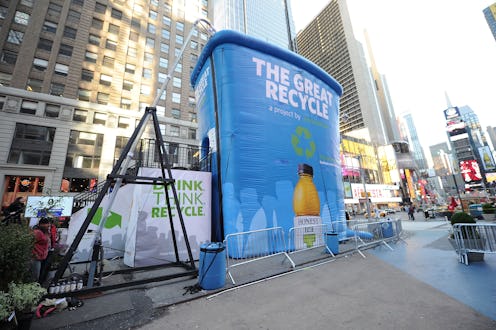
If you've KonMari'ed your home after watching Tidying Up with Mari Kondo on Netflix, you're probably recycling all of the stuff that doesn't bring you joy. While recycling is a great way to do your part for environmental protection, recycling mistakes are common, even among people with the best of intentions. The good news is that experts say they're also easy to avoid once you know what to do. "The biggest mistake people make when recycling is throwing away items they don’t realize can be recycled. Chargers, phones, laptops, couches, chairs, bookcases, and more don’t need to go to the landfill," Kevin Haseney, district commander at JDog Junk Removal & Hauling Tampa, a Military Veteran Partners company, tells Bustle.
"Not all items can go in your curbside recycling though, so it’s just a matter of figuring out where you can recycle an item. For instance, many companies that sell electronics have drop off bins for technology like old chargers, laptops, and TVs, or phones with broken screens." Unwanted furniture is another thing you might not be sure what to do with, especially if Goodwill or another local charity doesn't want your old coffee-stained couch. "There are recycling and junk removal companies that will take your furniture, break it down, and then recycle or repurpose the wood, cardboard, and other materials in it," Haseney explains. While it takes a little more time and effort to sort all of these items and identify how to dispose of them, that time is well worth it because it reduces clutter in landfills.
If your items are in good condition, you can search for place that accepts donations of gently used items. For example, when my roommate and I moved this past summer, we found a website that connected us directly to local groups that accept furniture and other household items. Because my father is a veteran, we chose a group that donates items to military veterans and their families. All we had to do was fill out a form, schedule a pick-up day, and put the items outside on the appropriate day. The group came and took everything off our hands, and our old items are now getting a second life.
While recycling is easier than ever before, many people don't realize that different recycling labels on items mean different things. In addition, recycling programs vary from city to city. Haseney recommends doing some research to see which items are recyclable in your city before tossing them into the curbside bin. Though you might be pretty confident that you know the appropriate way to recycle common items, perhaps you're not aware that there are specific protocols for recycling things like old prescriptions or items considered hazardous.
"Most people don’t realize many of the items in their homes are actually classified as household hazardous waste. The U.S. Environmental Protection Agency considers some leftover household products that can catch fire, react or explode under certain circumstances — or that are corrosive or toxic — as household hazardous waste," Wade Scheel, director of governmental affairs for Stericycle Environmental Solutions, tells Bustle. "Products such as paint, nail polish, batteries, electronics, hair spray, and even unused or expired medications are considered household hazardous waste and require special care during disposal."
If you have old prescriptions, you might be tempted just to toss them in the trash or flush them down the toilet and recycle the bottles. However, this means they can end up in landfills, contaminate ground water supplies, or be taken by someone without that prescription. The good news is that recycling your old prescriptions is pretty easy.
"You can bring unwanted pills to a retail location. Walgreens and Stericycle Environmental Solutions recently teamed up to install drug collection kiosks in Walgreens stores nationwide to provide a safe, convenient, and free way for consumers to return unused medication," Scheel says. In addition, you can mail them for proper disposal using Stericycle’s Seal&Send Medication MailBack Envelopes.
Both Scheel and Haseney say lack of knowledge about proper recycling protocols tops their list of recycling pet peeves. "Unknowingly, people often improperly dispose of household hazardous wastes by pouring them down the drain or toilet, on the ground and into storm sewers, or simply tossing them in the regular trash," Scheel says. "The dangers of such disposal methods might not be immediately obvious, but improper disposal of these wastes pollutes the environment and poses a threat to human health." Stuff people throw into sewers washes up on the beach near my house, and it's not a pretty sight.
Haseney says most people don't know that biodegradable items should be composted versus recycled — this was news to me. In addition, he says that just because something is made with recycled materials doesn't mean it can be recycled again. This is why it's important to read and understand the recycling labels on each item. "My biggest recycling pet peeve is when people don’t take the time to understand what the labels on recyclables mean and to find out whether that’s something that can be recycled through their local program."
If you didn't know about all of these recycling rules, you're not alone. However, by taking a little extra time to make sure your items get recycled properly, you can be a good environmental steward. It might not seem like one person can make a difference, but if each person does their part, that adds up to a whole bunch of individuals working together to protect the planet.